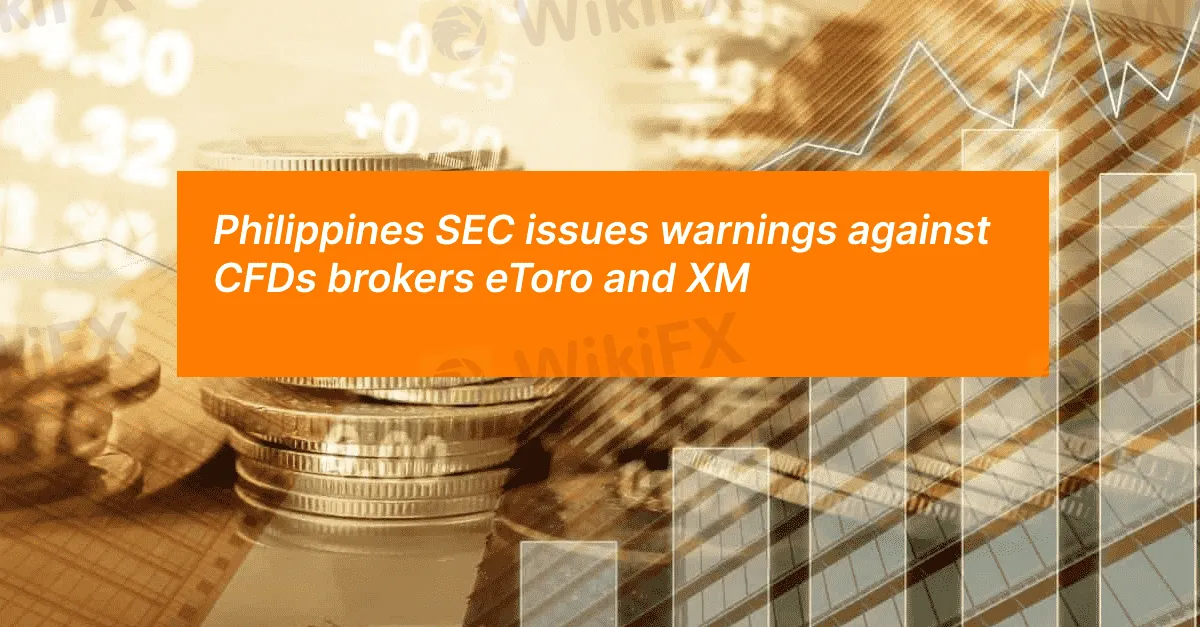简体中文
繁體中文
English
Pусский
日本語
ภาษาไทย
Tiếng Việt
Bahasa Indonesia
Español
हिन्दी
Filippiiniläinen
Français
Deutsch
Português
Türkçe
한국어
العربية
Philippines SEC issues warnings against CFDs brokers eToro and XM
Abstract:The Philippines financial regulator Securities and Exchange Commission (SEC) has issued two advisories this month, warning traders against two retail FX and CFDs brokers, eToro and XM.

The Philippines financial regulator Securities and Exchange Commission (SEC) has issued two advisories this month, warning traders against two retail FX and CFDs brokers, eToro and XM.
The Securities and Exchange Commission (SEC) of the Philippines has recently issued advisories cautioning traders against engaging with two Retail FX and CFDs brokers, namely eToro and XM.
According to the SEC, both eToro and XM have been actively promoting their trading platforms on various social media platforms, targeting Filipinos and enticing them to participate in trading activities.
On WikiFX, XM and eToro both have been given a decent score as they have a long history of forex trading in the markets.


eToro's platform can be accessed via its primary domain, etoro.com, which offers subdomains catering to different countries, including the Philippines, along with mobile applications. Similarly, XM's platform is accessible through its main website, xm.com, and its mobile apps.
While these platforms allow Filipinos to create user accounts for investing and trading, it's important to note that they offer unregistered investment products. In the Philippines, securities and investment products must be registered with the SEC before being offered to the public. This involves a thorough application process, providing detailed information about the securities, and the issuing entity, and obtaining necessary licenses.
Neither eToro nor XM are registered as corporations in the Philippines, and they lack the required licenses to sell or offer securities within the country. As a result, the SEC advises the public to exercise caution when dealing with these unregistered online investment platforms and their representatives.
The Commission emphasizes its previous advisory warning against dealing with non-registered foreign entities and corporations. Additionally, individuals acting as salespersons, brokers, dealers, promoters, influencers, or endorsers of eToro or XM within the Philippines, whether online or offline, may face criminal liability under the Securities Regulation Code (SRC). Penalties include fines of up to Five Million Pesos (approximately USD $88,500) or imprisonment for up to 21 years, or both, as stipulated in Section 73 of the SRC.
Conclusion
In light of these concerns, investors are urged to be vigilant and to verify the registration and legitimacy of any investment platform before engaging with it. If you want to know more information about the reliability of certain brokers, you can open our website. Or you can download the WikiFX APP to find the most trusted broker for yourself.

Disclaimer:
The views in this article only represent the author's personal views, and do not constitute investment advice on this platform. This platform does not guarantee the accuracy, completeness and timeliness of the information in the article, and will not be liable for any loss caused by the use of or reliance on the information in the article.
Read more

OctaFX Back in News: ED Attaches Assets Worth INR 134 Cr in Forex Scam Case
The Enforcement Directorate (ED) in Mumbai has attached assets worth around INR 131.45 crore. This included a luxury yacht and residential properties in Spain. Read this interesting story.

OANDA Rebrands TMS Brokers in Lithuania and Latvia Forex Markets
OANDA upgrades Baltic forex with TMS Brokers rebranding and new mobile app for enhanced trading technologies in Europe.

ActivTrades returns to profitability
London-based broker ActivTrades has released its financial results for 2024, signaling a robust turnaround following a challenging 2023. The broker recorded notable improvements in profitability, client acquisition, and capital reserves, marking a year of renewed momentum and strategic recalibration.

Admiral Markets: A Mix of Regulation and Risk
Despite multiple licenses, Admiral Markets presents potential red flags that traders should not ignore, including a suspicious clone alert and disclosure by Malaysia’s Securities Commission.
WikiFX Broker
Latest News
He Thought He Earned RM4 Million, But It Was All a Scam
CryptoCurrency Regulations in India 2025 – Key Things You Should Know
OctaFX Back in News: ED Attaches Assets Worth INR 134 Cr in Forex Scam Case
Trump inaugural impersonators scammed donors out of crypto, feds say
Ethereum is powering Wall Street's future. The crypto scene at Cannes shows how far it's come
Forex Hedging: Is It a Trader’s Safety Net or Just an Illusion?
US debt is now $37trn – should we be worried?
OPEC+ members agree larger-than-expected oil production hike in August
Top Wall Street analysts are pounding the table on these 3 stocks
US Jobs Data Out: Boom in Government Sector, Not So in Private Sector
Currency Calculator


